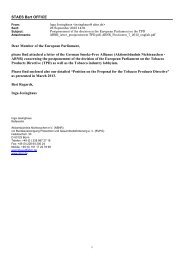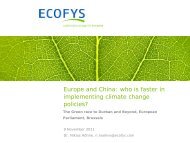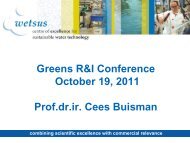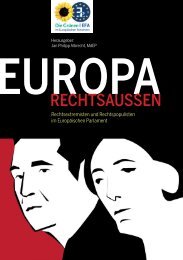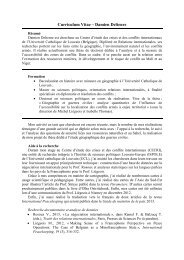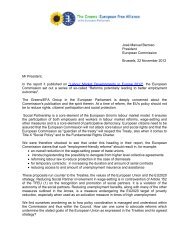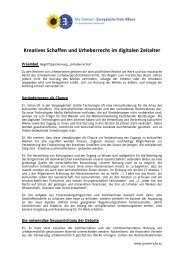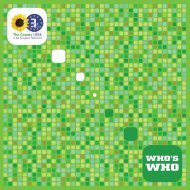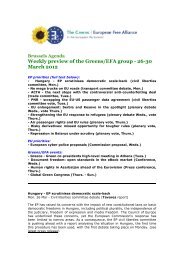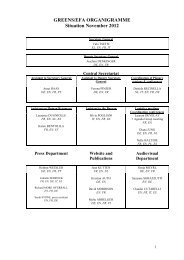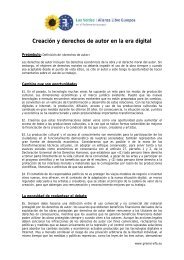Agro-Biotechnology: - The Greens | European Free Alliance
Agro-Biotechnology: - The Greens | European Free Alliance
Agro-Biotechnology: - The Greens | European Free Alliance
Create successful ePaper yourself
Turn your PDF publications into a flip-book with our unique Google optimized e-Paper software.
Introduction | Cloned farm animals - a ‚killing application‘? | 7<br />
Introduction<br />
Cloning farm animals has been technically feasible for several years. Several<br />
techniques are used, the most well-known being somatic cell nuclear transfer<br />
(SCNT). This technology was used to create the sheep 'Dolly' in 1996. Since<br />
then this technology has been successfully applied to several other species. In<br />
2008 discussion about cloning animals for food production took the stage in<br />
the <strong>European</strong> Parliament. <strong>The</strong> <strong>European</strong> Group on Ethics of Science and New<br />
Technologies (EGE) released a report (EGE 2008), and the <strong>European</strong> Food Safety<br />
Authority (EFSA) published two opinions (EFSA 2008a, 2009). In September<br />
2008 the <strong>European</strong> Parliament voted on a ban on cloning animals for food production<br />
through specific legislation. <strong>The</strong> Parliament in 2009 rejected the Novel<br />
Food Regulation being applied to this area3:<br />
"<strong>The</strong> <strong>European</strong> Parliament (....) calls on the Commission to submit proposals<br />
prohibiting for food supply purposes (i) the cloning of animals, (ii) the farming<br />
of cloned animals or their offspring, (iii) the placing on the market of meat<br />
or dairy products derived from cloned animals or their offspring and (iv) the<br />
importing of cloned animals, their offspring, semen and embryos from cloned<br />
animals or their offspring, and meat or dairy products derived from cloned<br />
animals or their offspring, taking into account the recommendations of EFSA<br />
and the EGE."<br />
But in 2010 the EU Council voted in favour of regulating products derived from<br />
cloned animals under the Novel Food Regulation (EC 258/97) 4 :<br />
“<strong>The</strong> definition of novel food and the scope of the regulation are clarified.<br />
According to the Council's position, the new regulation would explicitly apply<br />
to food produced from animals obtained by a cloning technique, and the scope<br />
of the regulation is extended to food from the offspring of cloned animals. <strong>The</strong><br />
Council invites the Commission to report on all aspects of food from cloned<br />
animals and their offspring within one year after the entry into force of the<br />
regulation and to submit, if appropriate, a proposal for a specific legislation on<br />
this topic.”<br />
In the addendum to the Council's conclusion 24 member states noted:<br />
“We also note that the majority of Member States are of the view that food<br />
produced from animals obtained by using a cloning technique and from their<br />
offspring should be regulated by specific legislation. Consequently, such foods<br />
should be excluded from the scope of the Novel Food Regulation as soon as<br />
specific legislation has become applicable. In the meantime, and in order to<br />
avoid any legislative gaps, those foods should be covered by the scope of the<br />
Novel Food Regulation. 5<br />
3 P6_TA-PROV(2008)0400 Cloning of animals for food supply PE410.750 <strong>European</strong> Parliament resolution<br />
of 3 September 2008 on the cloning of animals for food supply, http://www.europarl.europa.eu/<br />
4 http://www.consilium.europa.eu/uedocs/cms_data/docs/pressdata/en/agricult/113344.pdf<br />
5 http://register.consilium.europa.eu/pdf/en/10/st06/st06163-ad01.en10.pdf



